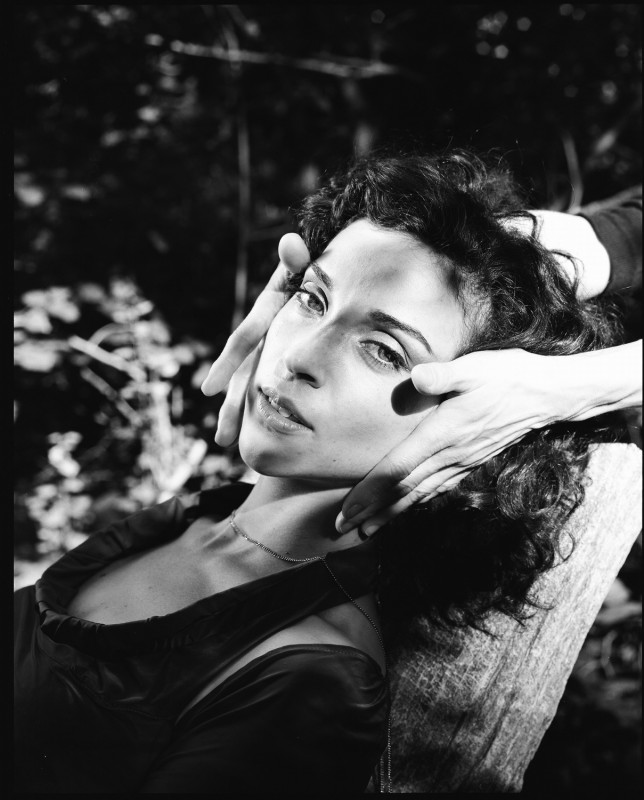St. Vincent speaks to FAULT
“Those subwoofers are something else! My knees just gave out!” Annie Clark yelps during sound-check. A former member of The Polyphonic Spree and Sufjan Stevens’ touring band, she has taken centre stage under the alias St. Vincent, with three exceptional solo records to date.
Support for the night comes from Cate Le Bon, an avant-garde singer whose weird vocal intonation produces a profound quality akin to Nico. Annie sits backstage in woollen knitwear and chunky specs, scrolling through some baby photos before setting the iPad aside to commence our interview.
Do you find much opportunity to meander during these European tours?
You sometimes get out. It’s brief but it is satisfying, you don’t stay long enough in a place to get bored and maybe you don’t get to see everything you’d like to see, but you at least get a sense of it, you get little insights into places and people. I don’t like necessarily being a tourist per say, if you don’t have friends in a place it’s hard to get to the core of it. I like to know how people live, not where the chain stores are.
What have been some of the tour highlights so far?
I did this Tom Waits cover show in Paris, it wasn’t strictly a St. Vincent performance. But the night before that, I played a little salon with a friend of mine, Steve Nieve [of The Attractions], a phenomenal piano player. He has an apartment out there with an upright and we’d just drink a bunch a white wine and I got up and sang, in front of a little audience, Cate [Le Bon] and Toko [Yasuda] sang back up vocals too, and it was all candlelit and just really nice.
In what ways, if any, have your impressions of Marry Me (2007) and Actor (2009) shifted since their respective releases?
You know I haven’t listened to either one of those records in years probably! So I imagine listening back to them would be like looking back at high school yearbook photo, like “Ooh, I probably wouldn’t have that haircut now, but meh, okay I guess that’s where we were at.”
For the live shows I’ve just reinvented some of those older songs to work in the current dynamic. Daniel [Mintseris], my keyboard player, is running Ableton Live [a loop-based software sequencer] so just has a total myriad of sounds at his disposal, creating a really flexible setup: the drums have triggers on them, the bass is fat and present, so songs can take on a new life rather quickly and easily because of our technological adaptability.
Strange Mercy (2011) was preceded by a series of teaser clips [directed by Alan Del Rio Ortiz of Vice Magazine], including one particularly evocative motif involving a feline eating her newborn kittens…
I began the record with the title track. Pondering those words they seemed to apply to a lot in life, generally speaking, so I set myself a challenge whereby each song has it’s own instance of strange mercy.
So would you say there’s a thematic cohesion?
Yeah it was written with that idea in mind…
During my readings, a description that kept arising in reviews was ‘Disney-esque’.
The music of Disney was a major inspiration behind Actor, that whole technicolour orchestral feel. I’d watch those films thinking, “how would I rescore this bit?”
Hypothetically if a production company were to offer you the main role in a stage adaptation of Snow White, to which you compose an original score, what would be your response?
Oh wow. Well I mean [hesitation] it might be a pretty dark version of Snow White. Although here’s the thing, people perceive fairytales as whimsical but they’re usually solemn morality tales intended to scare children into acting right…
With tracks such as Cheerleader or Laughing With A Mouth Of Blood in mind, how do you approach narrative in your song writing? Are you able to find a detached perspective or are characterizations derived from personal associations?
I mean ultimately it stems from me, so it’ll be coming from my lens and my filter. But I often try to do that also; I like to think about it as an empathy exercise, discerning the character’s perspective in any given scenario. It can often become quite personal but there’s a difference; I find it more interesting to tell a story then to be confessional or factually accurate about my own life.
Surgeon is built around a quotation from Marilyn Monroe’s diary that reads ‘best finest surgeon, come cut me open’. What specifically did you find so poignant about this excerpt?
Marilyn Monroe is an icon that worldwide, but I guess especially in America, is just taken for granted, acknowledged at face value but never really thought about. Yet when I started reading up on her I discovered I had a lot of compassion for her. She really was a pretty fascinating woman, a really smart woman and rather intuitive it would seem, but also very troubled. People often feel that, if only this one thing in me could be fixed then life would be okay, things would be somehow better. What I found so compelling about the sentiment, ‘best finest surgeon, Lee Strasberg come cut me open’ is that it specifically speaks to that kind of desperation and sadness that I think everybody feels…
She was studying at the actor’s studio under the tutelage of Lee Strasberg. Beginning with the Stanislavski method of acting, his acolyte, Lee Strasberg created ‘the method’. You hear people today talk about method acting; that is less to do with an objective and an approach, but rather more about putting yourself through everything that the character would experience. If a character must cry you might think about a time your mother slapped you – it’s more about sense memory recollection. So that’s what she found, Lee Strasberg was her mentor and coach, an inspirational father figure. You can see the overlap right? The person who’s the actor who’s also a bit troubled, studying this method that is kind of borderline psychotherapy… like being cut open. It’s fascinating.
The Vanity Fair title, ‘Worldwide Exclusive! Marilyn’s Secret Diaries’ is quite absurdist in many ways. I If I could draw a speculative comparison, the media similarly seem to have caught onto your Seattle ‘loneliness experiment’ [isolation during writing process of Strange Mercy] and turned it into the focal point of discussion, often prying into the incredibly personal…
Intriguingly her therapy sessions were actually taped; they’re going to be releasing those too. Poor woman, just leave her be!! I feel bad cause I’m potentially responsible for being exploitative also, though at least I know my intentions come out of an admiration of this amazing individual.
I try not to become just another pariah, so I’ll talk about whatever I’m comfortable with. Sometimes you get interviews that seem to go really well, a pleasant interaction, but the outcome is totally weird. The thing about the music press is that journalists usually attack it from an angle. Some artists have press stories about drug addiction, you know rock n roll myth, but I wouldn’t have many of those anyway! I guess I’m relieved and glad that I’m asked about topics like the writing process or technology and how that plays into what I do. I think ultimately if I were a fan and a young musician, reading about such processes would be exciting; I’m personally more interested in the mechanics of how someone does what they do. I do also have a private life, but I’m not a person that would just air my dirty laundry to the press. Not that I really have any scandalous stories.
Did you hear about the forthcoming series of Arrested Development, in which each episode focuses on a particular character, ahead of a feature film? Is your initial response that of anticipation or ambivalence?
YES! But I feel they keep teasing us with rumours… I’m really happy. I think everyone is. It’s a wonderful show.
Hypothetically speaking, if you were to be included as a cameo, in what capacity dya reckon?
One of my favourite gags was when George Michael was dating Anne, she was always a bit questionable. I would like to be another… love interest? But with some kind of palpable physical or personality defect, where it’s like ‘her?! really…?’
You’ve in the past mentioned literary figures such as Ernest Hemmingway or Dylan Thomas. Are there any writers with whom you almost wish you could appropriate their work, as though you had penned it yourself?
Right now I’m on a big Joan Didion kick. I’ve been reading The White Album, which is a book of her essays. She’s just so bright and graceful and quite stylish too, I appreciate that. Other than that, I was reading this book on evolutionary theory, written by Steven Pinker whose a Harvard dude. I’m curious as to why we are how we are and why some civilizations developed different to others. This is just how life is, oh but why? It’s not that exciting to just take things for granted.
Of all the persons you’ve previously encountered, whom in your opinion could you learn the most from?
Hmm. Gosh so many. I don’t really know. I’d say my aunt and uncle, a jazz duo called Tuck & Patti. They took me on the road with them when I was younger, up through my early twenties I tour managed them out on the road. I think they really taught me what it means to be a musician, in both a logistical and a spiritual sense. To be dedicated to what you do and approach the work with enough humility and resolve. They would always say ‘Be good to the music and the music will be good to you’. That’s nice.
Did you have a bit of a jazz upbringing?
Yeah, in so far as they gave me Mingus and Coltrane records, Charlie Parker, Sarah Vaughan, you know…
How did your acquaintance with David Byrne come about?
David is a New York fixture, he goes to so many shows, he’s so curious and engaged in the music scene, the arts scene and really the everything scene. He’d come to a bunch of St. Vincent’s shows, I met him there and he’s delightful, so completely kind that he’s not at all intimidating in the way that he could be. I’m a big Talking Heads fan. I’d say Remain In Light is my favourite of their records cause it’s so abstract but at the same time so catchy and pop [starts humming Once In A Lifetime] with that watery sound… such a great song! Also he doesn’t look back. He’s not one of those who goes ‘things were so much better back in 1979’. That’s a big lesson that I’ve learnt from him, just to always be moving forward, don’t get hung up on idealizing the past.
What is the nicest description anyone has ever given of your eyes?
Of my eyes?! Oh my god [laughs] I don’t think I’d remember… I’m not even sure if anybody has said anything, maybe not directly to me. Except my mom…
Daintily holding a teacup she enters the stage, with sleeves of yellow plumage likening her in appearance to Tweety Pie. The impression is misleading, as anecdotes of Upper East Side interior decorators are interspersed with a lament for what punk has become [a pink toilet brush by the name of Syd Dishes] and a thrashy rendition of She Is Beyond Good & Evil from The Pop Group. With lights extinguished, a red glare smoulders from beneath as Annie Clark, like a soul possessed, steps forward with ire and menace deep into the body of onlookers, chanting the incantation ‘Your lips are red, my face is red from reading your red lips. My hands are red, my hands are red from sealing your red lips.’

